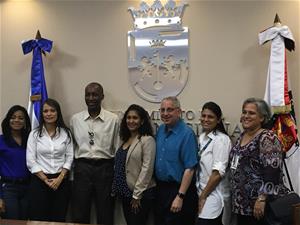(Note: Marc Ott's mesage has been translated to Spanish, and shared with ICMA’s international affiliate, the Dominican Federation of Municipalities (FEDOMU), host of the International Summit).
Dear Members:
I am overwhelmed by the outpouring of well wishes in response to my March 31 email. Thank you so much for your support, encouragement, and optimism. This “Dear Members” column is the second in what I hope will be a series of informal communications with you.
During the last week in March, I attended my first ICMA international meeting, the 4th International Regional Summit, which was hosted by ICMA’s affiliate, the Dominican Federation of Municipalities (FEDOMU), in Santo Domingo, Dominican Republic (DR). The objective of the week’s meetings was to create a space where we could exchange national and international experiences in municipal management in areas related to the promotion of resilient cities. We traveled to the DR because ICMA is currently working on two projects in that region focused on climate adaptation and crime. Both projects are funded by the U.S. Agency for International Development (USAID).
I was deeply affected by the experience. As an ICMA member for 35 years, I had never fully understood the important role that our professional association plays in the world, particularly the impact we have in developing nations. During the six days that I was in country, I learned what the “I” in ICMA’s work was all about, and I want to share my experience with you.
My education began the moment I stepped off the plane at Las Américas International Airport, where I was immediately mesmerized by the colorful culture and language of the people. During the ride to our hotel, the local scenery clicked by outside my window like pictures in a flipbook; scenes of aging infrastructure and dilapidated housing in the poorer neighborhoods that gradually gave way to a sophisticated Caribbean city with a bustling downtown.

My first day in country, I attended the International Committee meeting, where a group of 14 internationalist members—capably led by Chair Michele Meade—ICMA President Lee Feldman, President-Elect David Johnstone, staff, and I reviewed the committee’s work plan (see photo, right). The plan was designed to ensure ongoing and meaningful connections with ICMA’s 31 international affiliates, the ICMA Executive Board, and other association committees and task forces on international issues. Over lunch, the committee received a fascinating briefing from the DR Ministry of Health on the country’s response to the Zika virus and similar threats.
On days two and three of the summit, we joined local mayors and municipal staff, FEDOMU executives and staff, national government officials, international cooperation agencies, and International Committee members for a variety of presentations and workshops related to the construction of resilient cities.
Over the course of the summit, I realized that in the DR, the USAID-funded programs and projects are as much about addressing the hardships of the human condition as they are about providing a contracted list of deliverables. Local officials in the DR face many of the same challenges that we as managers in developed nations face on a daily basis—land use planning, climate resilience, and the social prevention of crime and violence. Unlike the challenges in many of our communities that resulted from the Great Recession, shifts in the economic landscape, or demographics, the challenges facing DR officials require a level of resources and expertise that is virtually unavailable in country. Thus the importance of the municipal development work in which ICMA is engaged to build the capacity of local individuals and organizations.

The most poignant part of the trip for me came when Lee Feldman and I took a long walk away from our hotel and found ourselves in a part of Santo Domingo where the poverty is pervasive, and it seemed as if every section of housing and infrastructure was in disrepair. We sat outside a bodega on a corner and watched the vehicular traffic and pedestrians converge at a busy intersection where there were no traffic signals. We were in awe that the people weren’t struck or that the cars didn’t crash into one another.
It was while sitting at that corner that, for me, the trip transitioned from professional to personal. I recognized the frustration and exhaustion in the faces and voices of so many of the people, and I suddenly understood why ICMA is there. We are there to make a difference, to enhance the quality of life for this developing region’s residents.
It was difficult to leave the DR at the end of our six days, but if all goes as planned, ICMA’s successful work in this region will continue for several more years, and I will have an opportunity to return to the region. The challenges that the DR (and many other parts of the world) face are great, but there are numerous opportunities for ICMA and for us as members to share our expertise and bring back knowledge to our own communities. It’s a two-way street, and seizing these opportunities takes commitment and leadership. I encourage each and every one of you to consider participating in ICMA’s international programs to help improve the lives of millions of individuals throughout the world.
I want to thank ICMA staff members Isabelle Bully-Omictin, Cintya Renderos, Ross Hoff, Lauren Crawford, David Grossman, DR-based ICMA team, and the FEDOMU staff and leadership for their outstanding work on this trip. Kudos for a job well done!
Sincerely,

Marc A. Ott
Executive Director
ICMA
New, Reduced Membership Dues
A new, reduced dues rate is available for CAOs/ACAOs, along with additional discounts for those in smaller communities, has been implemented. Learn more and be sure to join or renew today!
